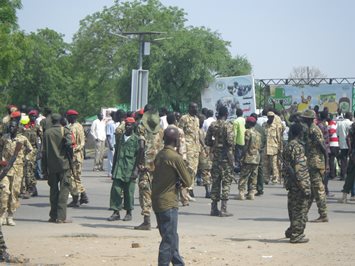Disabled South Sudanese soldiers stage protest over unpaid salaries
March 24, 2014 (JUBA) – Disabled soldiers from the South Sudanese army (SPLA) wounded during the recent outbreak of violence in the country staged a protest in the capital, Juba, on Monday, over delays in the payment of their salaries.

Soldiers who spoke to Sudan Tribune said they were protesting over the government’s failure to address a number of issues affecting military personnel, including delays in salary payments.
Soldiers have complained about delays in salary payments and the omission of names on the payroll.
One soldier, who now uses a walking stick to keep himself upright, told Sudan Tribune that he had not been paid for four months.
“The rebels wounded us and these people (government authorities) don’t want to pay our salaries,” he said on condition of anonymity.
Captain Dut Wal, who is one of those affected, told Sudan Tribune on Monday that authorities had not yet responded to any of the demands made by soldiers or taken action to address payment issues.
He said it was unfortunate that the government appeared not to appreciate the contribution of armed forces to the defence of the country.
“This is a peaceful demonstration. The essence of it is to draw the attention of the government so that some of the issues we have raised through [the] administrative chain of command and have not until now been addressed are brought to the attention of the senior leadership,” he said.
SOLDIERS LEFT OFF PAYROLL
Sergeant Major Abui Samson said he was left “speechless and angry” after learning his name was not listed on the army payroll despite being wounded in active combat.
“Actually I realised I made a wrong choice and grave mistake in joining the army. I thought I was responding to the national call to defend our country, hoping that the leadership would also look after me and the family,” Samson told Sudan Tribune.
“I want the public to tell me whether I and some of my colleagues have [made] a mistake in joining the army. I also want to the public to tell us whether we have [done] anything wrong to ask for payment. And whether it is right to omit the name of someone in hospital bed still recovering from wound like you can you?” he added.
SPLA spokesperson Col. Philip Aguer has admitted that some have not received their January salaries.
He said the issue arose after soldiers wounded in conflict zones were transferred to the capital for treatment as there is no automatic system set up to transfer money to hospital.
“The SPLA general headquarters is working on this issue and it will be resolved quickly,” Aguer said without providing a specific date.
ADMINISTRATIVE ISSUE
Cabinet affairs minister Martin Elia Lomuro said the government was working to address the “administrative” issue with “care and respect”.
“The leadership is handling it with care and respect. The situation has now been brought under control,” Lomuro told reporters on Monday.
The finance minister said his ministry had offered solutions for the issues raised by the soldiers, but did not elaborate further on how the matter would be resolved.
Wal, however, accused the government of “sitting on the issue”.
“Some of our colleagues are regretting and angered by behaviour of some government officials. If you cannot solve the issue brought to you, then why don’t push it ahead to someone who would handle it or forward it to the next level,” he said.
The protest remained peaceful throughout, with soldiers later retreating to their hospital beds.
This is not the first time soldiers have gone on strike over unpaid salaries, with similar action also taken in March 2009.
At least 60 soldiers were killed earlier this month after fighting erupted at Juba’s Geida military barracks following a dispute over salary payments.
Heavy gunfire erupted inside the barracks on the morning of 5 March while salaries were in the process of being paid, sparking widespread panic among city residents already jittery from mid-December clashes which erupted at the same facility between rival factions of the presidential guards.
It is undersood the incident occurred after some soldiers attempted to collect the salaries on behalf of some of their colleagues who were not listed on the payroll, but this was refused as government employees are now required to collect payments in person. The measures were implemented under a government directive to ensure wages are not paid to so-called “ghost” workers or those who do not show up during the payment period.
(ST)
– Salary dispute within S. Sudan army triggers heavy gunfire in Juba
– Scores dead in S. Sudan military clashes in Juba: eyewitnesses

